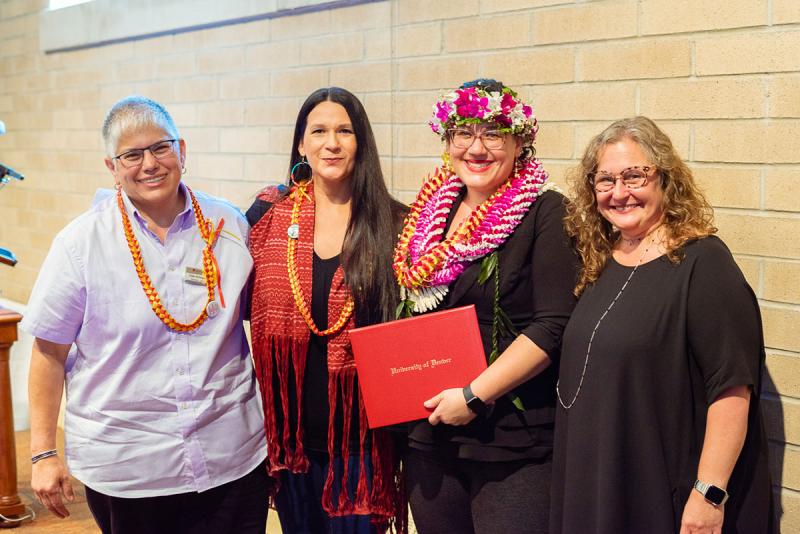Understanding Historical Loss and Mental Health
Award-winning dissertation research explores historical loss among Native Hawaiians

There’s a saying in doctoral education: The best dissertation is a done dissertation. For University of Denver Graduate School of Social Work (GSSW) alumna Antonia Alvarez, PhD ’19, the dissertation may be done, but the work isn’t over.
For Alvarez, sharing her dissertation findings with community partners and working with them to explore practice and policy implications of the work is every bit as important as the research and writing itself. After all, her overriding research question came from a community member: How does colonization affect the mental health of Native Hawaiians?
Native Hawaiian people — particularly lesbian, gay, bisexual, transgender, māhū (in Native Hawaiian culture, people who exhibit both feminine and masculine traits) and/or queer (LGBTQM) Native Hawaiians — experience disproportionate health and mental health disparities compared with other racial/ethnic minorities, and suicide among Native Hawaiians is a significant public health concern, says Alvarez, a queer, mestiza Filipina-American who worked as a Licensed Social Worker in Hawai’i.
With the aim of reducing disparities in health, mental health and suicide risk, Alvarez began exploring how historical loss impacts Native Hawaiians during her first quarter in the GSSW doctoral program, in a qualitative methods class taught by Professor Deb Ortega.
“I came in with the same question I left with. I had a community-driven question that brought me into the graduate program, and I was able to refine it throughout the years of training,” says Alvarez, who sought ongoing feedback and guidance from Native Hawaiian community members, Native elders, service providers and peers. “I never burned out on the question. The realness of the question and the meaning that it has in the community helped me stay focused and passionate.”
Alvarez’s dissertation — “‘We Were Queens.’ Historical Loss Among Native Hawaiians: Exploring Historical Trauma-Informed Suicide Prevention” — ultimately received the 2020 Society for Social Work and Research Outstanding Social Work Doctoral Dissertation Award.
Alvarez used sophisticated qualitative-dominant crossover mixed analysis methods to explore the ways that historical loss influences suicidality among Native Hawaiians. The research identified items from the Historical Loss Scale that were most relevant to Native Hawaiians and identified culturally unique LGBTQM perspectives and colonial experiences.
“It’s a different way to look at and think about non-continental Indigenous people. We don’t all have the same sense of the cultural constructs about land, water, sea animals … not every Indigenous group sees and feels and understands it in the same way,” says Ortega, who was a member of Alvarez’s dissertation committee. Alvarez’s dissertation “blew me right out of the water. It was beautifully written, and thoughtful. In terms of my understanding of the world around me, it changed me.”
Informing Suicide Prevention Programs
“Acknowledging the collective and individual impacts of trauma could strengthen and inform [suicide] prevention programs,” says Alvarez, now an assistant professor at Portland State University School of Social Work.
Assistant Professor and dissertation committee member Anthony Fulginiti agrees. “Adopting a cultural lens, with an emphasis on historical loss and historical trauma, remains uncommon in the suicide prevention field, which traditionally has been more person-centric. But when you’re thinking in a person-centric way, you’re not thinking about how the individual is embedded in systems that exacerbate and ameliorate risk in disparate ways.”
“Antonia’s research brings a cultural lens to the issue of suicide risk, and that forces people to think about suicide prevention in a much more holistic way and think about how systems impact individual and collective suicide risk,” Fulginiti explains. “You need to have formative work that looks at culturally unique risk and protective factors to appropriately adapt interventions to work in a particular culture.”
Specific findings won’t be released to the public until they’re shared with Alvarez’s community partners first. In summer 2020, Alvarez will meet with Prevent Hawai’i Suicide task force members to discuss policy implications of her work, and she is convening a community advisory board to consider cultural adaptations to the Historical Loss Scale. Alvarez also aims to translate her findings so they’re more accessible to the community.
“What makes Antonia really remarkable is that she’s 100% committed to community, and that community actively drives the research process — they are actively participating along the way and are centered in every component of it,” says Associate Professor Ramona Beltrán, who chaired Alvarez’s dissertation committee. “That is daunting for scholars because it means extra labor, time, effort and commitment to relationships, which can often really draw out a process. But that commitment to the relational accountability is paramount.”
At GSSW, Ortega plans to incorporate Alvarez’s work in the Power, Privilege and Oppression course, using it as part of a discussion about cultural oppression. Thousands of students will be exposed to the work, which will inform their front-line social work practice. And, Beltrán, notes, Alvarez’s theoretical and methodological innovation is also likely to inform future research with diverse marginalized communities.
A Native Hawaiian elder who was present at Alvarez’s dissertation defense said, “[Alvarez has] done an honor to our community. This work has the potential to change how we do things even beyond suicide prevention.”




